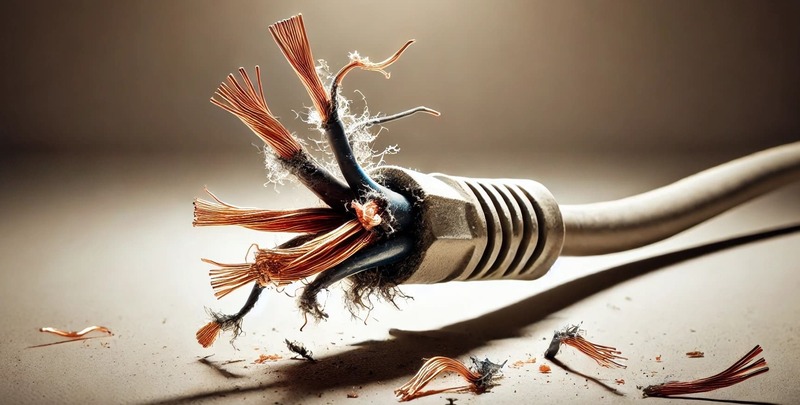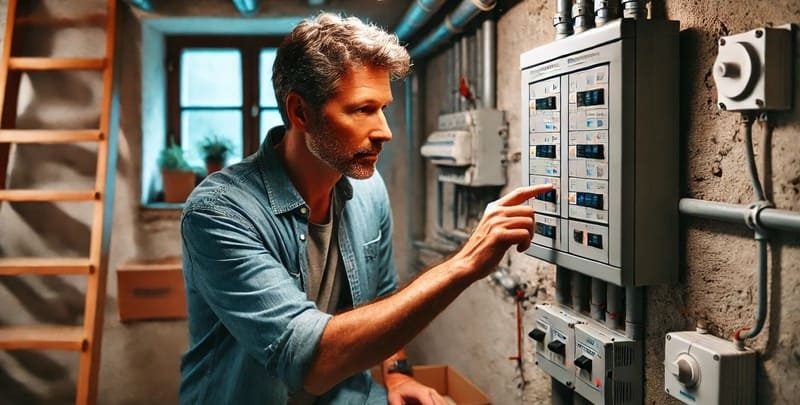# The Hidden Dangers of Exposed Wiring
Exposed wires in your home are far more than just an aesthetic issue—they pose significant risks to both your property and your loved ones. Whether caused by aging electrical systems, botched DIY projects, or general wear and tear, exposed wiring can lead to severe consequences.
From electric shocks to fire hazards, neglecting exposed wires leaves your home vulnerable. Many homeowners underestimate how swiftly a minor problem can escalate into something much bigger—and potentially devastating. It’s vital to tackle exposed wires immediately upon discovery to avoid accidents or even legal trouble if safety regulations are breached. In this article, we’ll delve into the dangers of exposed wiring and offer practical steps to safeguard your home against these unseen threats. Remember, safety always comes first when dealing with electricity.
## Electric Shocks and Burns
Exposed wires present a real danger of electric shocks and burns, putting your family at considerable risk. Here’s what you need to know:
- **Direct Contact:** Touching an exposed wire can result in painful or even life-threatening electric shocks. Children and pets, who might not recognize the danger, are especially at risk.
- **Burns from Electric Current:** In some cases, coming into contact with exposed wires can cause severe burns as the electric current passes through the body. These burns may appear at the point of contact and require medical attention.
- **Metal Objects:** Tools, jewelry, or appliances made of metal can accidentally connect with exposed wires, making it easier for electricity to travel through the metal and cause a shock.
- **Hidden Hazards:** Wires concealed behind furniture or walls can go unnoticed, increasing the chances of accidental contact.
Promptly addressing exposed wires can help prevent these dangerous scenarios and ensure everyone in your household remains safe from electric shocks and burns.

## Fire Risks
One of the gravest dangers associated with exposed wiring is the potential for fire. When wires are damaged or frayed, their insulation can degrade, leaving live wires exposed. These exposed wires can spark when they come into contact with materials like wood, drywall, or other wires. Over time, this can lead to small electrical fires that might go undetected until they grow into major house fires.
In many instances, exposed wires are hidden behind walls or in hard-to-reach areas, making it challenging to identify the problem before it’s too late. Electrical fires spread rapidly and can be difficult to control. Statistics show that faulty wiring is among the leading causes of house fires.
To mitigate these risks, it’s essential to conduct regular inspections of your home’s wiring, particularly in older homes. Addressing any issues immediately is critical. Always enlist the services of a licensed electrician to repair exposed wires and minimize the risk of electrical fires in your home.
## Short Circuits and Equipment Damage
Exposed wires can lead to short circuits, which can damage your electrical appliances and potentially result in costly repairs. Here’s how:
- **Short Circuits:** When exposed wires touch each other, they can create a short circuit, allowing electricity to flow along an unintended path. This can lead to overheating, tripped circuit breakers, or even fires.
- **Appliance Damage:** A short circuit caused by exposed wires can send a sudden surge of electricity through your appliances, damaging their internal components. This can render expensive devices like refrigerators, TVs, or computers useless.
- **Frequent Breakdowns:** Appliances and electrical systems exposed to frequent short circuits may malfunction repeatedly, reducing their lifespan and necessitating more frequent repairs.
- **Higher Utility Bills:** Wiring issues caused by short circuits can make your appliances less efficient, consuming more energy than needed and driving up your electricity bills.
Fixing exposed wires promptly is crucial. Routine electrical inspections can also help prevent short circuits and equipment damage, ensuring your home’s electrical systems operate safely and efficiently.
## Increased Risk in Wet Areas
Exposed wires in damp areas like bathrooms, kitchens, or outdoor spaces pose an even greater risk of electrocution. Water is an excellent conductor of electricity, so if exposed wires come into contact with water, the likelihood of an electric shock increases significantly.
Even something as simple as a dripping faucet or spilled water near an exposed wire can create a hazardous situation. Kitchens and bathrooms, where electrical outlets and appliances are often close to water sources, are particularly risky. Outdoor areas are also problematic, especially during rain or when sprinklers are in use. Anyone touching the exposed wire or any water it has interacted with could suffer a severe electric shock.
This underscores the importance of addressing exposed wiring, especially in high-moisture zones. Installing Ground Fault Circuit Interrupters (GFCIs) in these areas can offer additional protection, but repairing exposed wires should be your top priority for safety.
## Legal and Regulatory Concerns
Exposed wires in your home aren’t just a safety concern—they can also land you in legal hot water. Electrical codes exist to protect your property and its occupants, and failing to comply with these standards can result in fines or penalties.
As a homeowner, you’re responsible for maintaining a safe electrical system. Ignoring exposed wires can violate local building codes, especially if they lead to a fire or injury. This becomes particularly relevant if you plan to sell your home. Prospective buyers or inspectors will flag exposed wires, which could delay the sale or devalue your property. For rental properties, landlords must provide a safe environment, and exposed wiring can lead to tenant disputes or legal action.
To avoid these complications, it’s imperative to resolve any exposed wires immediately and hire a licensed electrician to fix them. Staying compliant with electrical safety regulations not only protects your home but also keeps you on the right side of the law.

## Handling Exposed Wires Safely
If you discover exposed wires in your home, it’s critical to handle the situation carefully to prevent accidents. Follow these steps:
- **Turn Off Power:** Locate your home’s electrical panel and switch off the power to the affected area. This eliminates the risk of electric shock.
- **Avoid Direct Contact:** Never touch exposed wires with bare hands, even if you believe the power is off. Use insulated tools or leave it to a professional.
- **Secure the Area:** Keep children and pets away from the exposed wires until they’re properly fixed.
- **Contact a Professional:** Exposed wires should always be handled by a licensed electrician. They’ll assess the situation, repair the wires, and ensure your home complies with safety standards.
- **Temporary Insulation:** If the wires are in a high-traffic area, you can temporarily cover them with electrical tape until a professional arrives.
Acting swiftly and safely helps prevent electric shocks, fires, and other hazards in your home.
## Prioritize Safety – Protect Your Family
Exposed wires in your home are a serious threat that shouldn’t be ignored. Whether they result in electric shocks, fires, or appliance damage, the risks are too significant to overlook.
Regularly inspecting your home’s electrical system and addressing any exposed wiring can save you from expensive repairs, legal issues, or worse—endangering your family.
If you ever encounter exposed wires, prioritize safety by turning off the power and contacting a licensed electrician to resolve the issue. Avoid relying on quick fixes or DIY solutions when it comes to electrical work.
By staying proactive, you can keep your home safe and prevent accidents before they occur. When it comes to electricity, safety should always come first.
**Please Note:** This information is intended for educational purposes only. Regulations vary by region, so consult your local authorities or an industry expert before proceeding with any work. For our full terms and conditions, click [here](#).
Stacked Spiral Machine,Agricultural Screw Press,Sludge Dehydrator,Sludge Filter Press
Changzhou Senjie Environmental Protection Equipment Co., Ltd. , https://www.senjie-hb.com
